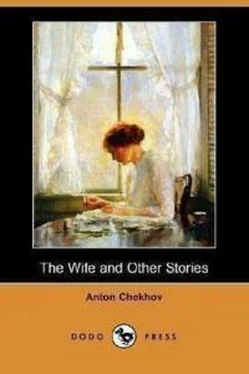Her chin quivered, she hastily wiped her eyes, and, with a cursory glance at the looking–glass, whispered:
"The old story is beginning all over again. Of course you won't go away. Well, do as you like. I'll go away myself, and you stay."
We returned to the drawing–room, she with a resolute face, while I shrugged my shoulders and tried to smile. There were some more visitors—an elderly lady and a young man in spectacles. Without greeting the new arrivals or taking leave of the others, I went off to my own rooms.
After what had happened at tea and then again downstairs, it became clear to me that our "family happiness," which we had begun to forget about in the course of the last two years, was through some absurd and trivial reason beginning all over again, and that neither I nor my wife could now stop ourselves; and that next day or the day after, the outburst of hatred would, as I knew by experience of past years, be followed by something revolting which would upset the whole order of our lives. "So it seems that during these two years we have grown no wiser, colder, or calmer," I thought as I began walking about the rooms. "So there will again be tears, outcries, curses, packing up, going abroad, then the continual sickly fear that she will disgrace me with some coxcomb out there, Italian or Russian, refusing a passport, letters, utter loneliness, missing her, and in five years old age, grey hairs." I walked about, imagining what was really impossible—her, grown handsomer, stouter, embracing a man I did not know. By now convinced that that would certainly happen, "'Why," I asked myself, "Why, in one of our long past quarrels, had not I given her a divorce, or why had she not at that time left me altogether? I should not have had this yearning for her now, this hatred, this anxiety; and I should have lived out my life quietly, working and not worrying about anything."
A carriage with two lamps drove into the yard, then a big sledge with three horses. My wife was evidently having a party.
Till midnight everything was quiet downstairs and I heard nothing, but at midnight there was a sound of moving chairs and a clatter of crockery. So there was supper. Then the chairs moved again, and through the floor I heard a noise; they seemed to be shouting hurrah. Marya Gerasimovna was already asleep and I was quite alone in the whole upper storey; the portraits of my forefathers, cruel, insignificant people, looked at me from the walls of the drawing–room, and the reflection of my lamp in the window winked unpleasantly. And with a feeling of jealousy and envy for what was going on downstairs, I listened and thought: "I am master here; if I like, I can in a moment turn out all that fine crew." But I knew that all that was nonsense, that I could not turn out any one, and the word "master" had no meaning. One may think oneself master, married, rich, a kammer–junker, as much as one likes, and at the same time not know what it means.
After supper some one downstairs began singing in a tenor voice.
"Why, nothing special has happened," I tried to persuade myself. "Why am I so upset? I won't go downstairs tomorrow, that's all; and that will be the end of our quarrel."
At a quarter past one I went to bed.
"Have the visitors downstairs gone?" I asked Alexey as he was undressing me.
"Yes, sir, they've gone."
"And why were they shouting hurrah?"
"Alexey Dmitritch Mahonov subscribed for the famine fund a thousand bushels of flour and a thousand roubles. And the old lady—I don't know her name—promised to set up a soup kitchen on her estate to feed a hundred and fifty people. Thank God…Natalya Gavrilovna has been pleased to arrange that all the gentry should assemble every Friday."
"To assemble here, downstairs?"
"Yes, sir. Before supper they read a list: since August up to today Natalya Gavrilovna has collected eight thousand roubles, besides corn. Thank God…. What I think is that if our mistress does take trouble for the salvation of her soul, she will soon collect a lot. There are plenty of rich people here."
Dismissing Alexey, I put out the light and drew the bedclothes over my head.
"After all, why am I so troubled?" I thought. "What force draws me to the starving peasants like a butterfly to a flame? I don't know them, I don't understand them; I have never seen them and I don't like them. Why this uneasiness?"
I suddenly crossed myself under the quilt.
"But what a woman she is!" I said to myself, thinking of my wife. "There's a regular committee held in the house without my knowing. Why this secrecy? Why this conspiracy? What have I done to them? Ivan Ivanitch is right—I must go away."
Next morning I woke up firmly resolved to go away. The events of the previous day—the conversation at tea, my wife, Sobol, the supper, my apprehensions—worried me, and I felt glad to think of getting away from the surroundings which reminded me of all that. While I was drinking my coffee the bailiff gave me a long report on various matters. The most agreeable item he saved for the last.
"The thieves who stole our rye have been found," he announced with a smile. "The magistrate arrested three peasants at Pestrovo yesterday."
"Go away!" I shouted at him; and a propos of nothing, I picked up the cake–basket and flung it on the floor.
After lunch I rubbed my hands, and thought I must go to my wife and tell her that I was going away. Why? Who cared? Nobody cares, I answered, but why shouldn't I tell her, especially as it would give her nothing but pleasure? Besides, to go away after our yesterday's quarrel without saying a word would not be quite tactful: she might think that I was frightened of her, and perhaps the thought that she has driven me out of my house may weigh upon her. It would be just as well, too, to tell her that I subscribe five thousand, and to give her some advice about the organization, and to warn her that her inexperience in such a complicated and responsible matter might lead to most lamentable results. In short, I wanted to see my wife, and while I thought of various pretexts for going to her, I had a firm conviction in my heart that I should do so.
It was still light when I went in to her, and the lamps had not yet been lighted. She was sitting in her study, which led from the drawing–room to her bedroom, and, bending low over the table, was writing something quickly. Seeing me, she started, got up from the table, and remained standing in an attitude such as to screen her papers from me.
"I beg your pardon, I have only come for a minute," I said, and, I don't know why, I was overcome with embarrassment. "I have learnt by chance that you are organizing relief for the famine, Natalie."
"Yes, I am. But that's my business," she answered.
"Yes, it is your business," I said softly. "I am glad of it, for it just fits in with my intentions. I beg your permission to take part in it."
"Forgive me, I cannot let you do it," she said in response, and looked away.
"Why not, Natalie?" I said quietly. "Why not? I, too, am well fed and I, too, want to help the hungry."
"I don't know what it has to do with you," she said with a contemptuous smile, shrugging her shoulders. "Nobody asks you."
"Nobody asks you, either, and yet you have got up a regular committee in my house," I said.
"I am asked, but you can have my word for it no one will ever ask you. Go and help where you are not known."
"For God's sake, don't talk to me in that tone." I tried to be mild, and besought myself most earnestly not to lose my temper. For the first few minutes I felt glad to be with my wife. I felt an atmosphere of youth, of home, of feminine softness, of the most refined elegance—exactly what was lacking on my floor and in my life altogether. My wife was wearing a pink flannel dressing–gown; it made her look much younger, and gave a softness to her rapid and sometimes abrupt movements. Her beautiful dark hair, the mere sight of which at one time stirred me to passion, had from sitting so long with her head bent c ome loose from the comb and was untidy, but, to my eyes, that only made it look more rich and luxuriant. All this, though is banal to the point of vulgarity. Before me stood an ordinary woman, perhaps neither beautiful nor elegant, but this was my wife with whom I had once lived, and with whom I should have been living to this day if it had not been for her unfortunate character; she was the one human being on the terrestrial globe whom I loved. At this moment, just before going away, when I knew that I should no longer see her even through the window, she seemed to me fascinating even as she was, cold and forbidding, answering me with a proud and contemptuous mockery. I was proud of her, and confessed to myself that to go away from her was terrible and impossible.
Читать дальше












